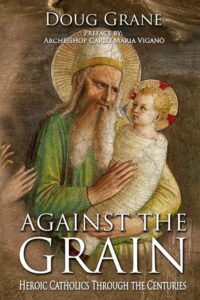 As everyone knows, some stores have made it (or have tried to make it) a policy to no longer refer to ‘Christmas’ in their stores and advertising but instead refer some sort of generic ‘Holiday’ or ‘Season’. Some have changed course due to backlash.
As everyone knows, some stores have made it (or have tried to make it) a policy to no longer refer to ‘Christmas’ in their stores and advertising but instead refer some sort of generic ‘Holiday’ or ‘Season’. Some have changed course due to backlash.
But what these stores don’t realize is that offending people isn’t their biggest problem. The bigger problem is that they would be undercutting the whole basis for their biggest moneymaker of the year. Because if what we’re celebrating isn’t Christmas, if it’s not about the birth of our Savior, but instead just a generic Holiday…then what is it that we’re all doing again?
The problem, of course, is that fewer people actually believe the Christmas story. Stores don’t want to lose the business, so they try to replace Christmas with something else. But it seems very strange that we all go so far out of our way, spend so much money, use so much time to celebrate…ummm, we’re not quite sure. Yes, to be sure, there is a ‘real meaning of [secular] Christmas’ – there is some reason that we’re being greeted in this Season. We’ve all gotten choked up when the Grinch famously realizes:
Maybe Christmas, he thought, doesn’t come from a store.
Maybe Christmas, perhaps, means a little bit more!
What that ‘little bit more’ is exactly, Dr. Seuss never tells us. But we all know what it is. It’s…something moving, something emotional, some vague sense that there is something more than all of the consumerism. Now, of course, the Holiday still is about the consumerism.
The Holiday without tons of presents, well, that’s the main thing we do on the Holiday! If we didn’t do that, then what would we do? The stores won’t let us forget that one. But even in the midst of it all, there’s something more, something deeper. We can’t name it, but we do know that it’s definitely related to our childhood and includes the Charlie Brown Christmas special.
So if the Holiday isn’t a holiday for anything specific, then what are we celebrating? And why are we doing it in December? And – most relevant to the stores – why are we spending all this money?
Some people have tried to make the Holiday actually about something. Here’s what they’ve come up with:
– In some places, it’s the ‘Winter Holiday’. So we’re celebrating the winter. Very inspiring.
– Maybe it’s more specific, like the Winter Solstice. You know, the days are the shortest they’ll be all year, they’re going to start getting longer. Cool, huh. But Winter Solstice is sometime between December 21st-23rd (and that’s only in the Northern Hemisphere). And I’m not sure that it warrants the month long preparation.
– So maybe we’re celebrating family or close relationships.
First off, we all know that it’s kind of a joke at this time of year that many people are culturally forced to spend time with people that they wouldn’t otherwise spend time with because they can’t stand them (I love my family, by the way). News agencies actually run stories with tips on how to survive your family during the Holidays.
But let’s assume that you have great family relationships. So why in December? And why are we all doing it at the same time throughout the country? It’s a lot of work to coordinate schedules and then to actually travel to see family at the exact same time that everyone else in the country is traveling to see family. If the Holiday is just a time for families to get together, that can be done at any time of the year.
Apart from Big Business wanting to cash in, the Jesus Seminar wanting to have a reason to publish something, and adults trying to relive or capture some sort of nostalgia about a childhood they never had, the Holiday no longer makes any sense for a secular culture. What we do, when we do it – when it’s not actually about Jesus – is now at best hollow, and at worst down right absurd. Yes, the Holiday, and all of the traditions surrounding them will probably stick around for a while – pick a flower and it doesn’t wilt right away – but, without any substance or reason for its existence, it won’t last.
And I couldn’t be happier! Christians should be celebrating! The death of the Holiday means that we will finally be able to go back to celebrating the Solemn High Feast of Christ’s Mass without it being hi-jacked by big business looking to profit on our religion. Good riddance!
Many Christians out there think that they are doing a service to the High Holy Day by trying to force stores to use their religion to advertise their products. I, for one, am glad that the sacrilege is ending. But regarding those fighting for stores to keep Christmas in their advertising, it seems they think ‘Christmas’ in secular culture maintains an opening for evangelism. This is a noble goal, of course, but it’s misguided because the secular celebration of Christmas obscures any real chance for Christmas to mean anything religious to non-Christians (heck, it’s hard enough for Christians). I say let the Holiday assume everything materialistic, sentimental, and hollow of the cultural celebrations of that time of year, and then let it die.
Then instead of being obscured by giant snowflakes, invented childhood sentimentality, and a made up story about a magical elf, Christmas will have some space to be itself. It will be free to actually be about the true story of when the ineffable, immutable, omnipotent, omniscient, omnipresent Creator and Sustainer of the universe was born to us as a frail little baby on a rescue mission to save us all from the grip of Satan, sin, and death. Now there’s some true meaning for ya. There’s something that can actually inspire awe and solemn contemplation, something that can actually feed the hunger for meaning that we all have.






6 thoughts on “Why Losing the War on Christmas is a Good Thing for the Church (But Bad for Business)”
Pingback: O Rex Gentium | Big Pulpit
Pingback: Why Losing the War on Christmas is a Good Thing for the Church (But Bad for Business) | cathlick.com
Brantly I agree…I find it interesting that so many Christians want us to say. boldly and loudly, “MERRY CHRISTMAS” to our non-Christian brothers and sisters (in the broader sense of the term as well as family) whether they wish to hear or celebrate it or not.
My birthday, which happens to be on Christmas Day, would quickly become pretty unpopular if everyone had to say MERRY BIRTHDAY–not to me but to each other!–each December 25. So why are we hell-bent (literally) on saying the phrase MERRY CHRISTMAS to non-believers and somehow thinking that it is a good way to share the love of Christ with others? We are doing it for ourselves, not for them.
So to my Jewish friends, I always try to wish a Blessed Hanukah, to my Muslim friends, a meaningful Ramadan, and to those who celebrate “Solstice” as you mentioned, to just have a Blessed Season or something similar.
Certianly to Christians I wish Merry Christmas of course. But to others I wish that one day they will understand that Christmas is a very real and solemn day of our Faith and not just a time to get fatter and more drunk.
But I will not accomplish that by forcing my “Merry whatever” greeting upon them whether they wish to hear it or not. Maybe. as you suggest, we are winning the war on Christmas after all and just have not realized it yet. Good, good post. Oh, and “Merry Christmas…”
Hanukah? That’s not in the Hebrew Scriptures – the event being commemorated is only recorded in the Christian Bible that Catholics use. Ever consider that you’re playing the Catholic cultural imperialist on your Jewish friends with your “Blessed Hanukah” wishes?
I don’t know if it so good that Christmas disappears from stores. There are advantages to being counter-cultural but ultimately the Church needs to transform culture not form a seperate nclave.
Obviously it shouldn’t reduce Christ’s birth to sentimental snowflakes. I think instead it would be great to see a nativity scene in the front of at least one department store. I mean, they have to be selling at least a few of them.
Living in Rome is a little different because there aren’t so many decorations. And then Italians do their elaborate 100+ figure nativity scenes.
Brantly, thank you for the article and the thoughts on this important subject. It got me thinking, but I’m not sure that I agree entirely. I agree that it should not be a priority for Christians to try to force stores to use the word “Christmas” as opposed to Holiday (or whatever else). That is not really evangelizing, and there are a million other fronts that needed addressed in order to help our culture see and celebrate the true meaning of Christmas. Forcing the use of the word Christmas should be extremely far down our list. At the same time, though, I don’t see the consumerism version of Christmas ending because people, one day or over a long period time, realize that they’re not celebrating what Christmas is actually about and therefore stop. Plenty of people get together now and share presents without acknowledging Christ at all, and some merely attend church for the second time that year. I guess I foresee the United States going under (and therefore forcing the end to the consumerism Christmas) before our society gets tired of it. Or if we enter some great depression the Church will have the perfect opportunity to share the true meaning because many or most won’t be able to celebrate the way they use to.
I very well could be wrong (that’s always a possibility), but I’m not sure I see why losing the war on Christmas is a good thing for us. But I also don’t see the use of “Happy Holidays” by stores as an awful for us. Regardless of what they call it the Church has a large job ahead of her in order to help our nation truly celebrate the birth of our Lord and Savior.
And Richard, I agree that we shouldn’t be offended if someone doesn’t wish us a Merry Christmas, and that we should have no problem wishing a Happy Hanukkah or whatever other sacred feast that non-Christians celebrate. Now, what goes on in schools is another conversation. In some public schools they will not speak of Christmas but will talk about Hanukkah and Kwanzaa. The deliberate exclusion of Christmas because it is Christian should be fought because of who this is being taught to: children. That, however, is a whole other discussion.
Peace. Happy Holidays! Just kidding 🙂 Merry Christmas.
But you, O Bethlehem Eph’rathah, who are little to be among the clans of Judah, from you shall come forth for me one who is to be ruler in Israel, whose origin is from of old, from ancient days.